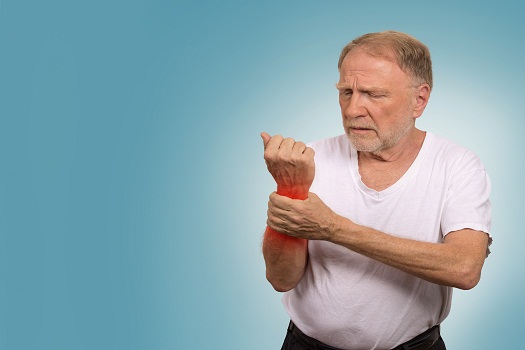Shoulder stiffness (“frozen shoulder”), back pain, hip pain, and neck pain are the most common musculoskeletal complaints among seniors with Parkinson’s. The good news for seniors as well as their loved ones and caregivers is that such discomfort can usually be addressed with a combination of medications, physical therapy, exercise, and diet.
Determining the Source of Musculoskeletal Pain
The first step in treating musculoskeletal pain in seniors with Parkinson’s is to determine the source of the pain. This is accomplished with diagnostic tests (X-rays, bone scans, ultrasounds, MRIs) along with a comprehensive physical exam that takes into account medical history, posture, and noticeable signs of impaired movement. Seniors are sometimes referred to rheumatologists or orthopedists for further evaluation.
NSAIDs
Anti-inflammatory medications, also known as NSAIDs, are often prescribed to ease inflammation associated with musculoskeletal pain. Over-the-counter medications like aspirin, ibuprofen, and naproxen can help when pain is mild. Prescription-strength NSAIDs are recommended when pain becomes more severe.
If your elderly loved one is living with a serious medical condition and needs help managing the tasks of daily living, reach out to Home Care Assistance, a senior home care agency you can trust. Our caregivers are available 24/7, there are no hidden fees in our contracts, and we offer a 100% satisfaction guarantee on all of our in-home care services.
Alternative Treatments
While not meant to replace traditional medical treatments, alternative remedies may offer additional relief from musculoskeletal pain. Alternative treatments have the added benefit of often reducing overall stress due to the relaxing nature of such remedies, which may include:
- Acupuncture/acupressure
- Chiropractic care
- Osteopathic manipulation (an approach to pain management designed to restore normal body functions)
Physical Therapy & Exercise
Exercises for Parkinson’s pain emphasize normal rhythmic movements, and research suggests physical therapy and exercise tend to help people with Parkinson’s manage musculoskeletal pain by enhancing gait, posture, and balance. There’s also increasing evidence suggesting exercises that promote learning and attention tend to be more beneficial for seniors with Parkinson’s. Such exercises include:
- Walking/marching (to music or marching in place)
- Yoga/tai chi
- Water aerobics (easier on muscles while offering the same benefits of regular aerobic exercises)
Exercising regularly and managing daily tasks can be difficult for aging adults with Parkinson’s disease. If your senior loved one needs hourly or live-in care, Barrie Home Care Assistance can help. Our caregivers can assist with exercise and mobility, prepare nutritious meals, provide timely medication reminders, and help with a wide array of other important daily tasks.
Diet
Diets likely to control musculoskeletal pain best are ones with “good” prostaglandins (chemicals that control inflammation) that reduce painful pressure on muscles and joints. Foods that can naturally reduce inflammation include:
- Fruits and green leafy vegetables
- Nuts (almonds, walnuts)
- Fatty fish (salmon, mackerel, tuna)
Parkinson’s is one of the many diseases that can impair a senior’s overall quality of life. There are a variety of age-related health conditions that can make it more challenging for seniors to live independently. However, many of the challenges they face can be easier to manage if their families opt for professional home care service. Barrie families can rely on expertly trained caregivers to keep their loved ones safe and comfortable while aging in place. To create a customized in-home care plan for your loved one, call Home Care Assistance at 647-970-3803 today.
